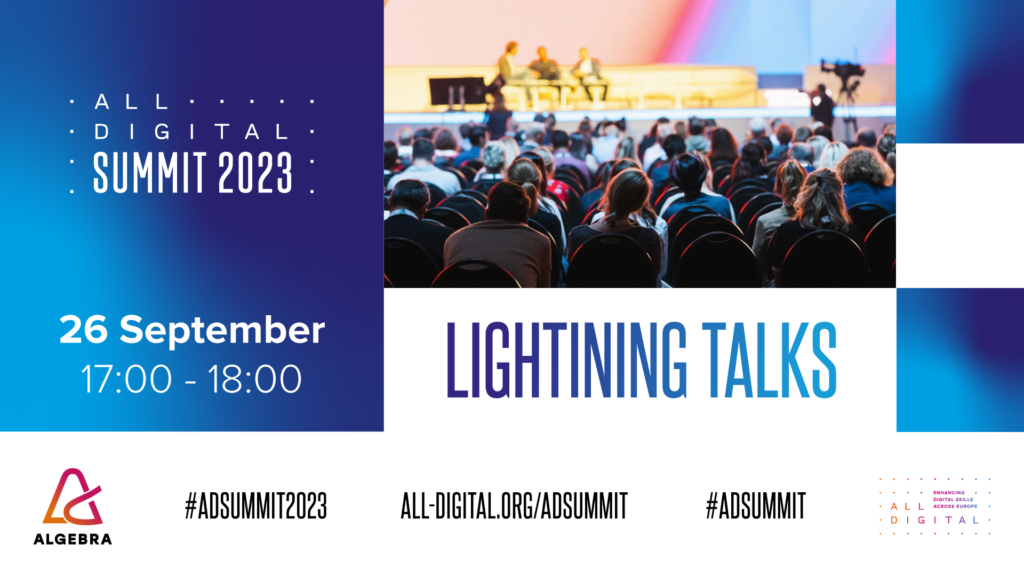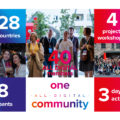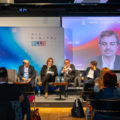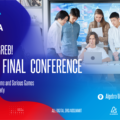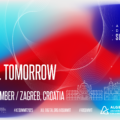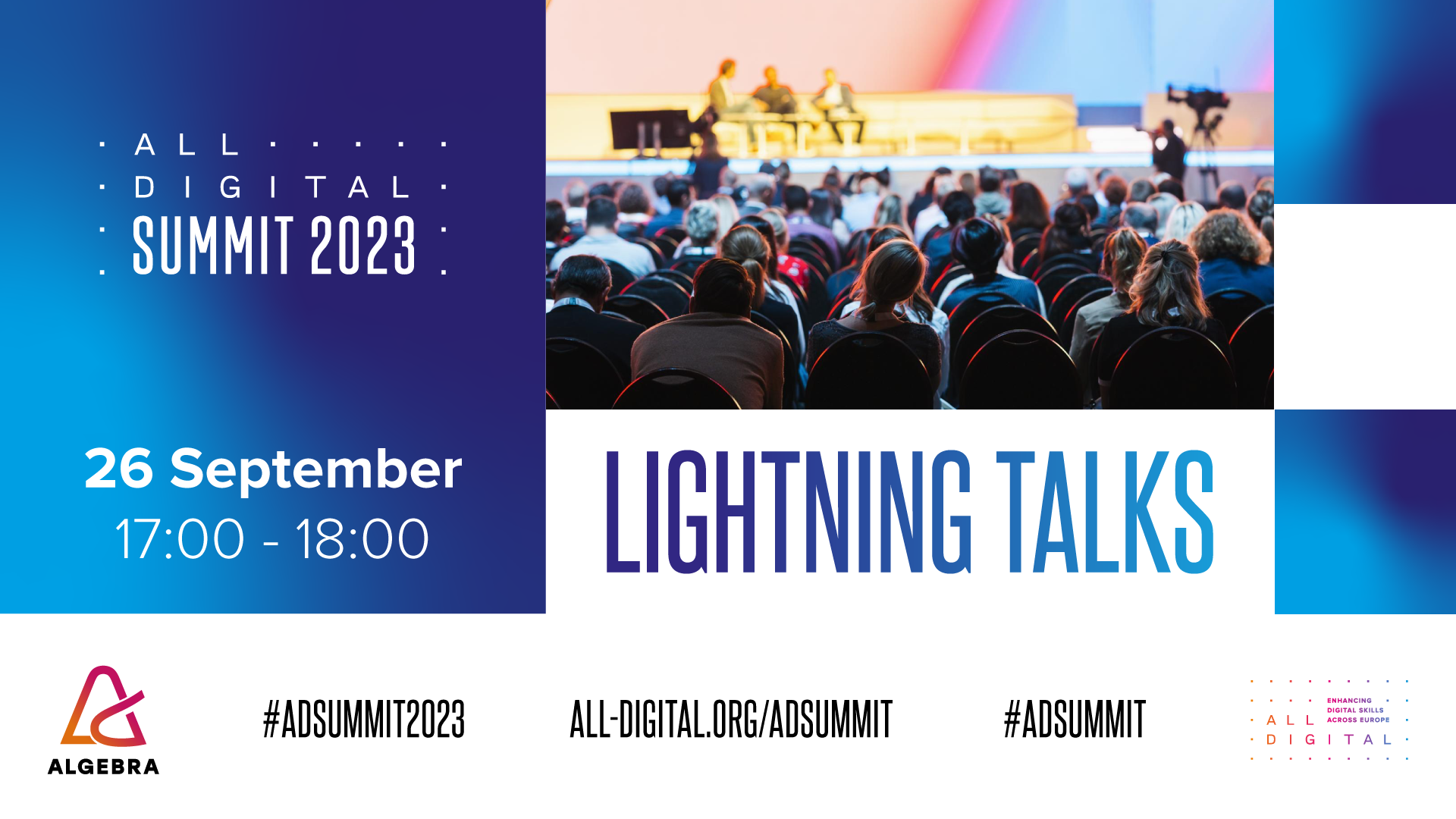
08 Sep LIGHTNING TALKS
08 Sep, 2023
Concept
Lightning talks consist of 5-7 minutes pitch to a diverse audience of experts in the digital skills and education field and represent an opportunity to hear about interesting activities, initiatives, and projects related to digital education in Europe. The presenters are ALL DIGITAL member organizations, as well as other organizations from formal and non-formal education settings, and aim at creating awareness about the impactful work they carry out.
To have an overview of the organizations and topics involved, have a look at the list below.
Presenters and Rooms
Room Nikola Tesla
The Digital and Innovation Hub of ALDA
ALDA’s Digital & Innovation Hub was created to take advantage of the digital means to pursue our organisation’s main purpose, namely fostering digital skills to make citizens more active and aware, and enhancing civic engagement with participatory processes that give substance to the notion of local democracy through offline and online tools.
Our Hub’s work in this direction can be better understood by looking at one of our newest projects called MEDIUM, an Erasmus+ project aiming to create education opportunities for municipalities related to Artificial Intelligence and Virtual Reality. The project is rooted in the belief that increasing digital skills in the public sector will foster both innovation and accessibility to public services, thus bringing the public administration closer to citizens and vice versa. At its core, the project provides local public officers from Belgium and Portugal with a high-level training on immersive technologies, on the metaverse and on participatory strategies.
Ultimately, the project will show public institutions that innovation in the public sector is possible and that leveraging digital resources can have indirect outcomes on civic engagement and participation.
Presenter: Dafne Sgarra, Project Manager, ALDA
Empowering critical thinking education in local communities
The goal of the project „Empowering critical thinking education in local communities“ from Lithuania is to strengthen media literacy, specifically critical thinking, by providing active representatives of local communities with the knowledge and tools to teach this to their community members. The project focuses in particular on school librarians who, by working in the field of information and media literacy and by reaching out to the wider school community, will be able to use the resources developed by the project to pass on the knowledge and skills of critical thinking to other teachers, students and their parents. The project is funded by European Media and Information Fund.
The lightning talk will focus on project highlights and main discoveries: (i) the survey of school libraries that revealed the great need of the ready-to-use educational materials and the potential for librarians to reach students and other teachers with their educational lessons; (ii) following the needs of target group the educational materials are being developed.
Presenter: Rita Šukytė, Association „Langas I Ateiti“
Exploratoris Project
Exploratoris are digital equity labs, where we involve teachers to reflect and experiment with challenges where it intersects education, technology, and equity. For instance, around such as IA and bias, or how to ensure better educational opportunities implementing maker culture in the Catalan distrital schools, among others.
At the Fundació Bofill, we want to empower the teacher leaders of communities. One of our purposes is to empower themselves and be part of the triggers for the educational community to participate in innovations, in an equitable and accessible way for everyone. In the Exploratoris, we are involving actors from all over the territory, giving them visibility, presence, and prominence together with references sharing knowledge and solutions to the educational challenges that challenge us.
Presenter: Héctor Martínez, Project Manager, Fundació Bofill
4. WeTechCare – France
Making society more inclusive through digital
Society is becoming more and more digitised in Europe and with it, all the useful services of daily life: public services, banking, welfare benefits, health, etc. Indeed, technology is at the heart of innovations and sometimes progress. However, for a cohort of people, digital technology is not a given. That is why WeTechCare has set itself the mission of making digital technology a vector for social progress. To do so, we are working on two main areas. On the one hand, we enrich the range of services offered by the social world by increasing their digital skills. On the other hand, we try to develop the digital autonomy of all publics. Since its creation, WeTechCare has succeeded in mobilizing a community of 15,000 social structures and has contributed to the digital autonomy of more than one million people. Nonetheless, there are still many challenges to be met. This year, we are working in particular on :
- 1) “Go-to” mechanisms (especially through social networks)
- 2) Evaluating e-learning opportunities, with a focus on measuring what technology can do, and what people must continue to do.
We have a strong experience in digital inclusion. First, by deploying action plans on large scales. Then on mobilizing all stakeholders: from the learner, to the caregiver, the structures, the networks of structures, right up to the definition of national strategies.This model has already been replicated in environments other than France. It is a source of opportunities for collaboration throughout the rest of Europe. We could share our experience and present some projects that can be replicated in other territories.
Presenter: Jean Deydier, founder & CEO
5. EPMA – Czech Republic
CyberBOX project
Under an ERASMUS+ partnership for youth, EPMA is with its project partners finalizing the development of an educational gamified program using artificial intelligence, including related methodology supporting development in topics in the field of personal cybersecurity. The gamified educational program aims at enabling youth, including migrant youth, to get more education about cybersecurity topics. The project is developed and tested in the Czech Republic and Slovakia and by end of September will be ready also for English speaking audiences as well as Ukrainian migrants.
During the lightning talks, EPMA would like to present the CyberBOX project to participants who can learn from our experiences and use the results that we obtained over the past year for the benefit of their target groups. During this lightning talk we will also follow up to the well-received GameBOX project workshop that took place at the 2022 Summit. GameBOX is another educational gamified program developed as a part of a larger platform.
Presenter: Iva Walterova, CEO, EPMA
6. Mediawijs – Belgium
Digital inclusion in local governments
Regarding digital inclusion, Mediawijs is working in different areas: from education to welfare. Our biggest project is the one aimed at local governments, consisting of three pillars. First, we provide a network, by bringing different organizations together in a taskforce, events, etc. The second pillar is a training course for employees of local governments. Finally, we focus on digibuddies, by providing them with materials and education. In the lightning talk, we will highlight each of these pillars with examples.
Presenter: Alenka Le Compte, Digital inclusion officer, Mediawijs
7. EVBB – Belgium
ACT – Virtual Exchange project
ACT, is a Virtual Exchanges project, which aims to bring together students and young people from European and Southern Mediterranean countries and through the implementation of different online formal and non-formal activities will develop the values of active citizenship, freedom, tolerance and non-discrimination. The target group of ACT, lies among students and academic and administrative staff of HEIs as well as youth workers active in their societies and special delegates of policy making bodies.
Presenter: Sonia Degroote, European Project Manager, EVBB
8a. DAISSy research group of Hellenic Open University – Greece
Special Education STEAM Academy
The SPICE project aims to enhance the competences of primary education teachers to effectively implement Inclusive STEAM Education and to bridge the gap between STEAM and special education. Two main outcomes of the project are the STEAM in Special Education Competence Framework and the Special Needs STEAM educator profile, which have been developed and will serve as the foundation for the design and development of a comprehensive Educational Training Programme for teachers. The project also seeks to establish a ‘STEAM in Special Education Alliance’ through a strong online Community of Practice.
Presenter: Natalia Spyropoulou, Educational Technology Specialist, Instructional Designer, Hellenic Open University (HoU)
8b. STE(A)M Education European Roadmap
The SEER project aims to provide roadmaps for policy and institutional changes to mainstream STE(A)M education in Europe. It assesses the status of STE(A)M education, evaluates policies, and offers recommendations to education authorities. The project has also established the SEER Network, a collaborative network of leading STE(A)M Education stakeholders, teacher training institutions, STEM industry representatives, and educational research organizations.
Presenter: Natalia Spyropoulou, Educational Technology Specialist, Instructional Designer, Hellenic Open University (HoU)
Room Vrancic
Libraries as gateways for all to access technology and life-long learning
In the rapidly changing world of technological development, artificial intelligence and diverse learning opportunities, public libraries are the only free place to access knowledge, information, technology and socialization for people of all ages and educational levels. The partners in the ADELE project (Advancing Digital Empowerment of Libraries in Europe) aim to answer this question by offering a free customizable web-based tool that will help adult education organisations to reflect on their use and where they can further integrate digital technologies to improve their services.
All members of the All Digital network are concerned with seeking and expanding opportunities for people to access technology, and use it for both formal and non-formal education and professional development. The results of the ADELE project may be useful for many of them and help them find suitable partners in Europe’s libraries.
Presenter: Melanie Mitrova, Global Libraries Bulgaria
10. CARDET – Cyprus
Universal Design and Pedagogical Practices for Low-skilled Adults
The project AdultDigitalUp aims to prepare Adult Educators who work with low-skilled adults, to become active participants in the digital and social arena.
This presentation explores the integration of Universal Design principles into pedagogical practices for enhancing digital skills among low-skilled adults. Emphasizing inclusivity, the project aims at developing the competencies of adult educators to use Universal Design to foster equitable and accessible learning environments. It highlights the necessity for adult educators to receive pedagogical recommendations that cater to the unique learning needs of low-skilled adults. Attendees will gain insights into effective strategies that empower low-skilled adults to develop essential digital skills, bridging the digital divide and fostering lifelong learning opportunities for all.
Preparing adult educators is one of the best investments for achieving the Digital Agenda for Europe.
Presenter: Charalambos Vrasidas, Executive Director, CARDET
11. COLECTIC – Spain
#CS4ALL – Living with technology: innovation in education!
Technology is a fundamental part of our live. The household appliances we have at home, public transport, or the mobile phone we always carry in our pocket work thanks to the software they carry. Daily contact with technology is inevitable, but at the same time very few people have the knowledge to understand how this software works and how to design and develop it.
We think it is key to change this!
We are convinced that programming is the new literacy skill, a basic skill that every boy and girl should learn. All girls and boys must have the opportunity to learn to program, regardless of their family, social or economic situation.
#CS4ALL is an innovative methodology and study program for teachers and educators working with kids and young people from 6 to 18 years, as well as a learning journey guiding young learners in a very structured way from offline activities to programming in Python.
Interesting for the audience: many All Digital member organizations offer training in digital skills and computational competences and probably interested in hearing about this new experience from Portugal, UK and Spain.
Presenter: Martina Mayrhofer, Organizing ICT projects, COLECTIC
12. CERTIPORT – Belgium
Future-proof your learners with Certification
A practical ‘how to’ guide on integrating certification to deliver future-proofed learners, with practical examples from All Digital Partners. The lightning talk is a a good fit for the theme of Skills for Digital Tomorrow of the Summit.
Offering certification as a measure of return on investment in training adds value to funded projects and bolsters funding applications – as well the results for the learners. Digital competence centres can increase their credibility through offering certification that increases employability, and inclusion for their learners.
Presenter: Arkadiusz Jaworski, Regional Director DACH, Nordics and CEE ,Certiport
13. GIRLS GO CIRCULAR – EU
Empowering girls with digital, green, and entrepreneurial skills
Girls Go Circular is an EU-funded education project that equips girls aged 14-19 across Europe with digital and entrepreneurial skills through an online learning programme on the circular economy. The programme is active in 23 European countries and has already helped training 27,000 girls in the last three years.
Are you interested in digital learning and gender equality? Do you wish to boost teenagers’ entrepreneurial mindset and environmental awareness? Join us while we discuss the Girls Go Circular programme and our learning-by-doing techniques to engage students in entrepreneurial role-plays and real-life societal challenges!
Presenter: Solène Moutier, Education Project Specialist at the European Institute for Innovation and Technology (EIT).
During the covid19 pandemic it was made clear that in order to be effective, teachers, not only had to be able to use digital tools but also they had to be aware of the social, emotional and affective aspects of digital technology-based education.
This issue is addressed by D-PAIDEIA, an Erasmus+ Forward Looking project which is working in order to update the DigCompEdu qualifications framework in order to take into account these aspects that emerged from the pandemic experience. Through extensive consultation with teachers and experts, D-PAIDEIA has proposed new skills and dimensions. It proposed to add three new elements in the Professional engagement dimension of the framework as well as a fifth dimension on the teachers’ pedagogical competencies area (Social Skills and Communication)
Based on this updated qualifications framework, the project aims to train teachers and practitioners (of all levels) on these skills and to develop a method and provide support to educational institutions in order to develop pedagogical digital strategies that will help them to coordinate their efforts, in the framework of a whole school approach.
Presenter: Kostas Diamantis-Balaskas, Project manager and coordinator, Action synergy
15. European Council for Steiner Waldorf Education (ECSWE)
Communicating Our Humanity: Development-Oriented and Holistic Media Education
In the HERMMES project 11 partners gather their knowledge to help children and young people to become media mature by the end of their school career. They should be able to use the full range of analogue and digital media for their own education, participation in civil society and the labour market. But to achieve this, the timing and form of using digital media in education should be closely aligned with the developmental phases of children.
Therefore, parents, teachers and researchers have joined their resources to work towards helping children and young people to become resilient and media mature citizens who can make their own informed choices on WHETHER and HOW they use digital technology in a humane way.
The lightning talk will focus on the unique cooperation between schools and parents to achieve this goal, and on how a holistic approach can best serve pupils’ interest in becoming tech-savvy and resilient adults.
Presenter: Dora Šimunović, Advocacy and PR coordinator, European Council for Steiner Waldorf Education (ECSWE)
16. Generalitat de Catalunya –with Xarxa Punt TIC – Spain
Bridging the structural gap: 7 key ideas to tackle digital inequalities
The Catalan Government is developing a National Strategy for socio-digital inclusion to face the present and the future challenges of digitization, as well as to promote the improvement of inclusive and safe development, with the aim of drawing up a work plan for the digital Catalonia of 2030.
What makes our journey different? The singularities of this endeavor can be summarised in 7 key ideas:
- Deployment of the Catalan Charter of Digital Rights and Responsibilities
- Socio-digital perspective, not only digital but paying attention to intersections between age, gender, origins, capacities and more
- Departing from the human-centric approach, one of the main European digital rights and principles
- In a mature digital society, citizens have access and knowledge to use sufficiently the digital tools and domains. This includes from basic skills to fostering talent and vocations, as well as the empowerment of knowledge and the critical view of the citizenry in the face of the impact of emerging technologies such as artificial intelligence, the Internet of Things, quantum computing
- Testing collaborative schemes inspired by mission-oriented innovation
- Inclusive perspective, multistakeholder based on the 4H, inviting specific social groups
- Contributing to the Digital Decade and the Digital Compass, as well as fostering initiatives aligned with the twin transition (green and digital), as proposed as proposed at the EU level
This action allows responding to the new challenges that citizens face in terms of digitization. Likewise, the strategy will consider the development and implementation of new technologies applied to improving the socio-working conditions of the most vulnerable people and the leadership of the transition towards inclusive digitalization.
Catalonia is piloting a national strategy against the digital divide. In this journey aiming to build strategic alliances throughout Europe. We kindly invite to join the conversation to any other regional or national governments and organizations potentially interested in facing the structural challenge of the digital divide.
Presenters: Ms. Liliana Arroyo, General Director of Digital Society (Generalitat – Government of Catalonia) and María Esther Subias Vallecillo, Technical Manager, Pla de Xoc contra la Bretxa Digital


